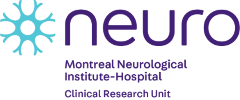2024 in review: The Neuro expands clinical trials testing targeted therapies for rare and genetic conditions

December 19, 2024
By Sophie Lorenzo
This year, a wave of new RNA therapies as well as our very first gene therapy trial launched a new chapter at the Clinical Research Unit at The Neuro (CRU).
RNA and DNA treatments for rare genetic diseases are poised to have a direct impact on disease progression – well beyond simply managing symptoms – bringing in a wind of change and hope for patients.
A first for gene therapy in Canada
This was a big year for the CRU: we conducted the first gene therapy study ever at The Neuro, which also happened to be the first gene therapy trial for dementia in Canada. The cutting-edge treatment being studied in this phase 1 trial is a single-dose viral vector therapy for individuals with Frontotemporal Dementia with the progranulin (GRN) mutation. Researchers hope that by delivering a working copy of the GRN gene, the body can then increase the production of progranulin protein, potentially slowing down the progression of this young-onset dementia.
Learn more: https://cru.mcgill.ca/geneftd.
RNA therapies for a rare disease that is overrepresented in Quebec
After years with few treatment options for myotonic dystrophy, researchers are testing a promising therapy that targets the genetic problem at the heart of this rare disease which affects 1 in 500 people in the Saguenay-Lac-St-Jean.
If the treatment is approved, it would be the first time we could change the course of the disease, rather than trying to mitigate symptoms.
Learn more: https://cru.mcgill.ca/myotonic-dystrophy.
Made-in-Quebec research charts a new course to stop ALS
Finding a way to repair the damage caused by ALS in the neuromuscular junction — which connects nerve and muscle cells — would be a major step in treating the disease.
Research by Richard Robitaille, a professor and researcher at Université de Montréal has shown in preclinical studies that an approved treatment for overactive bladder could also block the overactive cells that cause the nerve-muscle connection to breakdown in ALS, improving mobility and strength. The clinical trial is currently testing whether this effect will translate in humans.
Learn more: https://cru.mcgill.ca/neuromuscularjunction/
Can we stop Alzheimer’s Disease before it starts?
Recently approved Alzheimer treatments remove amyloid plaques in the brain and help individuals with dementia live with a more slowly progressing disease. While this is an important advance, these approved medications can’t repair the damage that’s already been done.
However, a clinical trial at The Neuro is testing whether a potential new therapy could stop amyloid from accumulating before it even starts – a potential new step that could stop the onset of the disease.
Learn more: https://cru.mcgill.ca/alzheimer-amyloid/
Reaching immune cells in the brain to treat MS
Some of the most effective treatments we have for MS are monoclonal antibodies. Because they too big to cross the blood brain barrier, there is a cap on their effectiveness.Researchers may have found a way to engage receptors on the blood-brain barrier to allow certain large molecules to cross – creating a type of ‘brain shuttle’. A new trial at the CRU hopes to show that this technique could allow treatments to reach immune cells in the brain itself to address the underlying inflammation that may smolder between MS relapses.
Learn more: https://cru.mcgill.ca/blood-brain-barrier-ms.
A second chance for patients with brain tumours
Every day, 27 people in Canada are diagnosed with a brain tumour, a third of which are malignant. Quebecers with brain tumours who are followed at The Neuro benefit from access to world-renowned specialists and cutting-edge clinical trials, which are often not offered elsewhere in Quebec.
Read the story of one patient who was able to have a second chance thanks to the care received at the Neuro after a recurrence of glioblastoma, a highly aggressive form of brain cancer.
Learn more: https://cru.mcgill.ca/brain-tumour-patients.
For more information on clinical trials at The Neuro, visit cru.mcgill.ca, and contact (514) 398-5500 or info-CRU.neuro@mcgill.ca.



